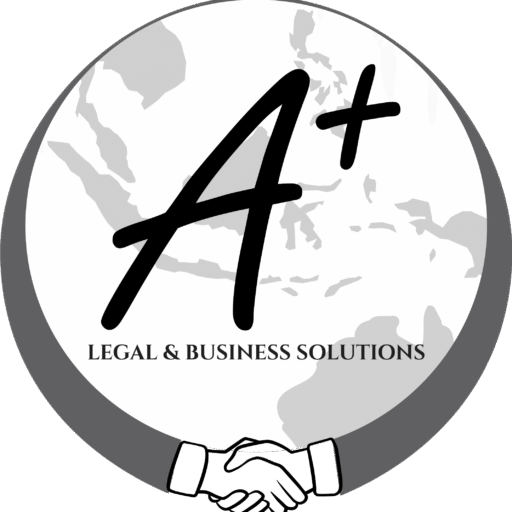APlus Legal & Business Solutions
Frequently Asked Questions
Limited Liability Company (PT)
Covers the fundamental aspects of a Limited Liability Company in Indonesia, including its definition, establishment requirements, ownership rules (local and foreign), capital provisions, governance structure, and obligations.
Yes. The status change is carried out by adjusting the company deed, ownership structure, and re-registering with the OSS (Online Single Submission).
Business Licensing
Explains the licensing framework for businesses in Indonesia, including the role of OSS RBA, NIB, KBLI classifications, use of virtual offices, and procedures for updating company information.
NIB is a business identity issued through the OSS (Online Single Submission) system and serves as a basic business license.
OSS RBA (Online Single Submission Risk-Based Approach) is an online licensing system from the government to manage business legality, including NIB, location permits, and operational permits.
KBLI is a business activity classification code. Selecting the appropriate KBLI is very important because it determines the type of license required.
Not all classifications in KBLI can be used by PMA; there are several classifications that do not allow PMA to conduct business activities in those fields. This is regulated in Presidential Regulation No. 10 of 2021 concerning Investment Business Fields and Presidential Regulation No. 49 of 2021 concerning Amendments to Presidential Regulation No. 10 of 2021.
The address can still be changed, provided that the domicile/address in the PT Deed certified by a notary is changed, and the data in the OSS and taxation system is updated.
Yes, for certain types of businesses, virtual offices are permitted under Government Regulation No. 5 of 2021 concerning the Implementation of Risk-Based Business Licensing and various derivative regulations from the Ministry of Law and Human Rights, as well as the Minister of Finance Regulation and the latest taxation policies such as PMK 81/2024 and PER-7/PJ/2025, which allow the use of virtual offices for PKP with certain requirements.
Taxation
Provides guidance on company tax obligations, including filing requirements for newly established businesses and criteria for becoming a Taxable Entrepreneur (PKP).
Labor Law
Covers the regulations regarding employment in Indonesia, including rules for foreign workers (permits, KITAS, validity), types of employment agreements, and company obligations to create and register company regulations.
Foreign workers can work as private laborers/employees, but companies must still prioritize domestic workers.
Yes, a work permit is required for foreign workers. Work permits for foreign workers in Indonesia involve several administrative and legal stages.
Types of work permits: (1) Foreign Worker Utilization Plan (RPTKA) – Approval document from the Ministry of Manpower allowing companies to employ foreign workers for certain positions and time periods. (2) Limited Stay Permit Card (KITAS) – A physical/digital card proving a TKA has a Limited Stay Permit, required for administrative purposes (e.g., opening a bank account, obtaining an NPWP).
The validity depends on the activities performed, usually 180 days up to 10 years, in accordance with Article 105 of Permenkumham Number 22 of 2023 on Visas and Stay Permits.
Two types of employment agreements: (1) Fixed-Term Employment Agreement (PKWT); (2) Indefinite-Term Employment Agreement (PKWTT).
Intellectual Property
Explains the scope and types of intellectual property rights in Indonesia, including trademarks, copyrights, patents, and related protections. It also highlights protection durations and the importance of registration for legal security and exclusive rights.
Intellectual property is a right arising from human intellectual work that produces a work or product of economic value.
Types of Intellectual Property: Copyright, Trademarks, Patents, Industrial Designs, Trade Secrets, Geographical Indications, Integrated Circuit Layout Designs, Plant Variety Protection (for agriculture).
A trademark is a sign that can be displayed graphically (image, logo, name, word, letter, number, color, 2D/3D form, sounds, holograms, or combinations) to distinguish goods/services produced by individuals or legal entities (Article 1 point 1 of Law No. 20 of 2016 on Trademarks and Geographical Indications).
Copyright protects creative expressions (songs, art, literature). Patents protect inventions (technology, products, processes, machines).

